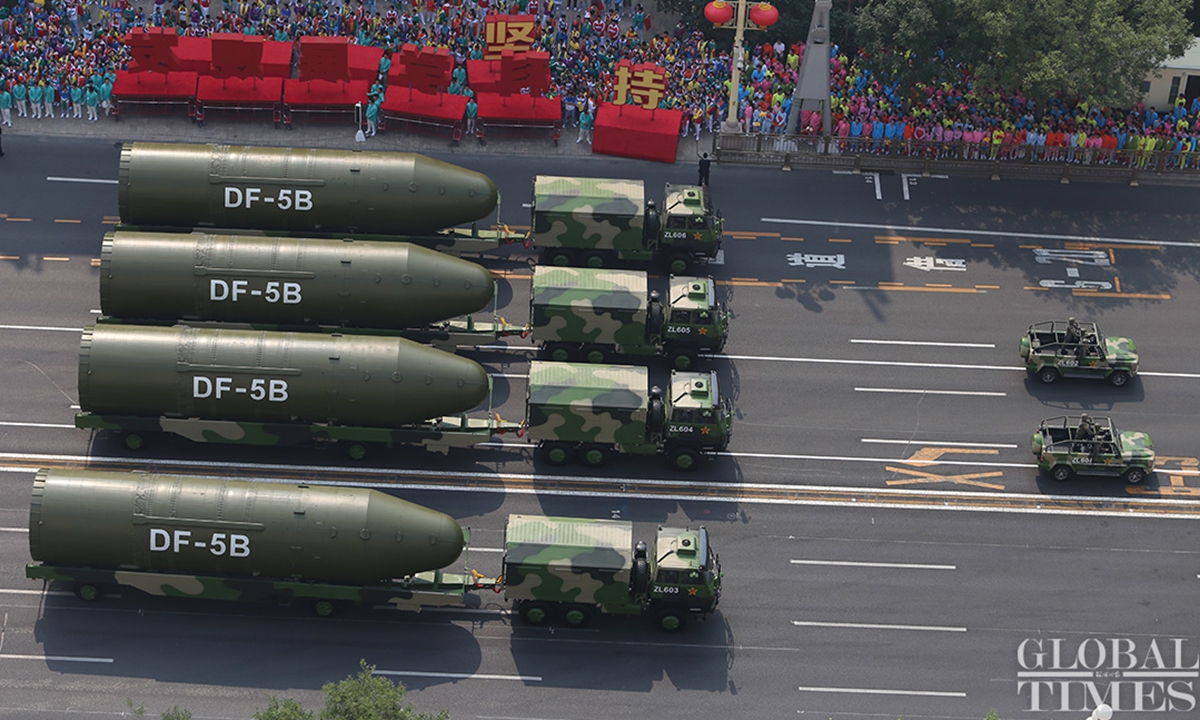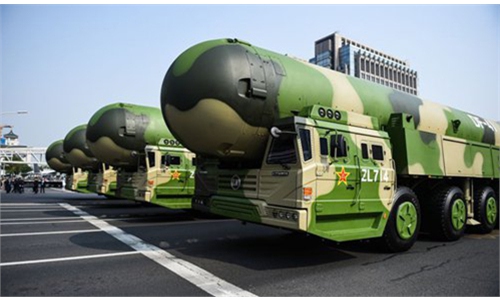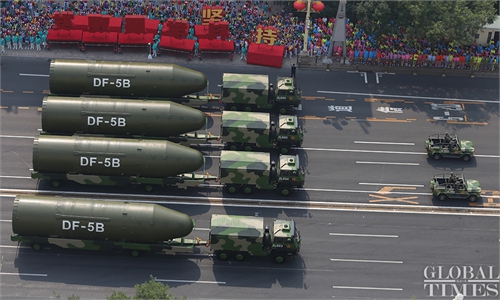Three US senators incite confrontation with lies about 'nuclear parity': Global Times editorial

DF-5B intercontinental ballistic missiles Photo: Fan Lingzhi/GT
Three Republican House leaders of the House Foreign Affairs Committee, the Armed Services Committee and the House Permanent Select Committee on Intelligence, in a letter to US President Joe Biden, asked him to come up with a comprehensive inter-agency strategy to convince Beijing to hold arms control talks on a nuclear force buildup. They indicated in the letter that "China will achieve nuclear parity with the US by 2029" if the US does not take action.
The three senators' description of the pace of China's nuclear buildup and their assessment of the comparison between China and the US nuclear forces are full of lies. The purpose is to mislead US society and US government, create the false impression that China and the US have started a nuclear arms race similar to the ones during the Cold War era, and to incite hostility toward China in the US society as well as the Western world.
The three senators described China's military structure as a "triad of nuclear assets" and projected with confusing figures that China's warhead arsenal will double, triple, or even quadruple in the coming years and will be likely to produce up to 1,000 nuclear warheads by 2030.
However, even if all of China's indicators hit the high end of their predictions, it was nothing relevant to the common notion of a "nuclear parity" among the great powers because the US has up to around 6,000 nuclear warheads, not to mention the massive investment in nuclear innovation that started with the Trump administration. The US' nuclear advantage over China will be a long-term one.
No Chinese will support a nuclear arms race with the US at a level similar to the one during the Cold War. And it will never become a realistic national defense policy of China. But China must have a credible and adequate second-strike capability. China's number of nuclear warheads must increase with the growth of US' strategic threat to China, in a bid to ensure a high efficiency against US nuclear deterrent. This is China's sacred right as a major power and it also constitutes one of the cornerstones of China's national security.
Some US political elites are uneasy about China's nuclear buildup, but it is their own problem. The only way they can overcome this anxiety is to maintain strategic respect toward China and refrain from threatening China. Being threatened is regarded as taboo by major powers. China's overall military strength still lags far behind that of the US, and China has a long-standing commitment not to be the first to use nuclear weapons. As long as Washington does not have an ulterior motive or plan, and will not carry out nuclear blackmail against China in a crisis, it has no reason to worry about China's attempts of consolidating nuclear deterrence, because China will never take the initiative to engage in nuclear blackmail against the US.
If the US wants to be reassured by the fact that China could only yield to a nuclear threat, rather than be able to rise up in resistance, then, sorry, they are demanding too much. They need to change their mind-set and security concept. There is no reason for China to be responsible for their inexplicable insecurity.
The important thing is that the US has no means to prevent China from increasing nuclear deterrence. We have seen most of the US' coercion tools. There is no way for them to force China into a bilateral or trilateral nuclear arms control negotiation of no fair basis. Other tricks such as coaxing will also not work. On this issue that involves China's core interests, nobody can shake China's reasonable and firm attitude.
The Chinese people love peace and oppose war, nuclear war in particular. This has been proven by not only the no-first-use nuclear weapons commitment made by China, but also by the fact that China has not been engaged in a war for over 30 years while during the same period of time the US military has fought wars all over the world. Today's US has become the biggest variable that constantly provokes confrontation among major powers. What it needs to do most is to manage its ambition well so that the US and the rest of the world can be safe.



